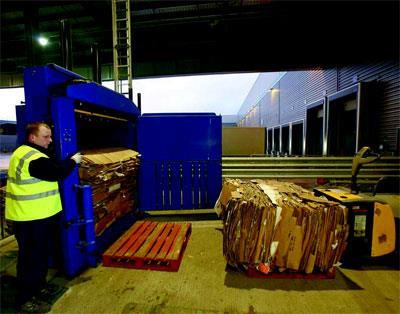
Keystone Distribution/McDonald’s
Keystone Distribution manages the supply chain for McDonald’s 1,172 UK restaurants. It has DCs in Hemel Hempstead, Basingstoke and Heywood, and runs 140 vehicles on the contract, which make in excess of 200,000 store deliveries each year. Since 2008, Keystone has collected, initially through a third party, used oil from the restaurants for conversion to bio-diesel. Since that time a cumulative total of 6.6 million litres of biodiesel has been produced. However, the company has now implemented a closed loop reverse logistics approach, with its delivery vehicles fitted with purpose-made 200 litre capacity tanks. Since 2011, during restaurant deliveries used oil is pumped into the Keystone vehicle. The oil is transported back to the operator’s DCs and prepared for collection and onward delivery. Having initially collected used oil during scheduled slots, the initiative has been broadened to encompass all restaurant deliveries. An off-shoot of this has been an improvement in the quality of oil collected, and a higher amount converted into biodiesel. In 2011 collections of used oil from McDonald’s restaurants saved the equivalent of 1,333 tonnes of CO2. The judges thought the concept of delivering food and then back-hauling waste oil from the restaurants was "great". They also noted that the entrant had built on what they were doing a year ago and had taken the concept to the next level. "It’s really well thought through," said another member of the judging panel.
Coca-Cola Enterprises
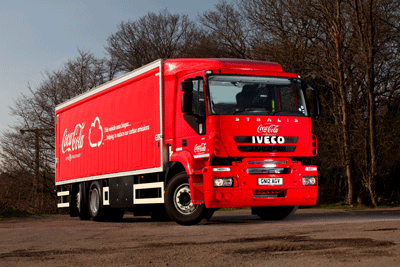
Coca-Cola Enterprises (CCE) has a fleet of 225 vehicles, which completed 44,534 multi-drop journeys during 2011. A further 216,520 customer journeys were completed by haulage partner fleets – so all in all CCE’s carbon footprint is a large one. In line with a Corporate Responsibility and Sustainability (CRS) programme aimed at reducing the environmental impact across the supply chain, CCE has had C02 measurement underway since 2007. To make it happen, the company set up a CRS Transport Workgroup, to drive through change. Key initiatives include: improved operational efficiencies (front and backhaul collaboration, development of rail network opportunities); use of clean transport technologies (dual-fuel vehicles and biomethane powered trucks); installation of energy efficient systems (solar, ground source heat pump; lighting). In 2011 CCE saved 2,600,000kms of road mileage, drove transport cost savings of more than £1,000,000 through efficiency initiatives, amd reduced transport CO2 by in excess of 2,280,000kgs. Judges thought that despite a wide range of initiatives being underway they very much felt "joined up" within Coca-Cola, and part of a well structured, thought-through approach.
WM Morrison Supermarkets
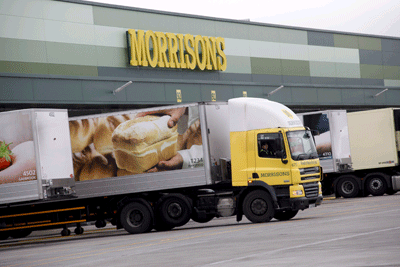
Morrisons recognised long ago that reducing its carbon footprint and efficient working went hand in hand. To that end, since 2009 it has looked at four areas within its transport division to achieve this. It’s resulted in a cut in carbon emissions by more than 85,000 tonnes of CO2 from this time up to the present. This has been achieved through in-house engineering for greater fuel efficiency (measures such as running on thinner engine oil), the introduction of double deck trailers to its vehicle fleet and efforts to improve vehicle fill. A network reorganisation kick-started by the opening of a DC in Sittingbourne, Kent, in 2009 has saved the business 20-million road kms, and nearly 50,000 tonnes of carbon over four years. Judges were impressed by the supermarket chain’s innovative website promoting backhaul services and "a good use of data showing [carbon] savings made compared with business growth". Its concise award entry, which didn’t waste time selling Morrisons the company, and instead concentrated on detailing its environmental achievements was also praised.
Yearsley Group
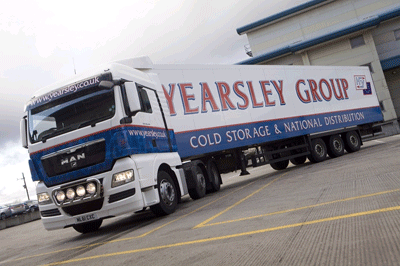
Yearsley Group has set itself the ambitious target of reducing its carbon footprint by 80% by 2020 (from a baseline set in 2007). The family owned business, set up in 1955, has 12 depots across the UK and annual turnover of £150m. Not to mention no time to waste if it’s to achieve its goal. Installation of £2.2m of solar panels at the company’s facilities – at 2,500 sq ft each thought to be some of the largest roof mounted solar panel systems in the UK – has followed. A partnership with Tesco that sees the retailer performing its share of backhaul duties has cut out an estimated 1,350 dedicated deliveries previously made from Yearsley’s Bristol depot to the supermarket chain’s Daventry NDC. And a focus on load fill saw, in the case of food retailer Iceland, an improvement through collaboration with the chain’s suppliers of more than 35%. This means Yearlsey is delivering an average of 25.8 pallets on every load into Iceland’s consolidation centres. Our panel were impressed with the "wide range of initiatives" the company had in play, noting stated investment figures showed a real commitment to "what they are trying to achieve".
Abbey Logistics Group
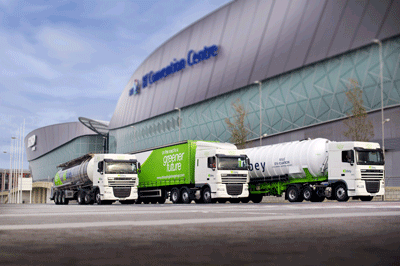
Tanker fleet firm Abbey Logistics is on the move, having grown its business by 50% in the past two years. Having started in bulk liquid foodstuffs, it has expanded into complementary sectors and now has more than 200 trucks and 300 employees. Since 2009 the company has used six key performance indicators to measure its carbon footprint. Three have a direct impact on greenhouse gas emissions. The others have saved in terms of reduced landfill and water usage. Subsequently Abbey has launched a 30-point environmental action plan. One of the company’s more eye-catching initiatives has been the recent introduction of a "twin cargo trailer". In an attempt to eliminate empty running – prevalent due to the geographic spread of liquid food manufacturers – Abbey commissioned its dual trailer, which is capable of carrying both liquid and palletised goods at the same time. Judges commended the firm for "the number of initiatives" it had underway such as it’s practical, no nonsense water-recycling systems (in Liverpool and Hull) that use the final rinse water on each tank wash in the first rinse cycle on the next tank.











